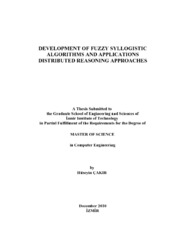Please use this identifier to cite or link to this item:
https://hdl.handle.net/11147/3057Full metadata record
| DC Field | Value | Language |
|---|---|---|
| dc.contributor.advisor | Kumova, Bora İsmail | en |
| dc.contributor.author | Çakır, Hüseyin | - |
| dc.date.accessioned | 2014-07-22T13:50:48Z | - |
| dc.date.available | 2014-07-22T13:50:48Z | - |
| dc.date.issued | 2010 | en |
| dc.identifier.uri | http://hdl.handle.net/11147/3057 | - |
| dc.description | Thesis (Master)--Izmir Institute of Technology, Computer Engineering, Izmir, 2010 | en |
| dc.description | Includes bibliographical references (leaves: 44-45) | en |
| dc.description | Text in English; Abstract: Turkish and English | en |
| dc.description | x, 65 leaves | en |
| dc.description.abstract | A syllogism, also known as a rule of inference or logical appeals, is a formal logical scheme used to draw a conclusion from a set of premises. It is a form of deductive reasoning that conclusion inferred from the stated premises. The syllogistic system consists of systematically combined premises and conclusions to so called figures and moods. The syllogistic system is a theory for reasoning, developed by Aristotle, who is known as one of the most important contributors of the western thought and logic. Since Aristotle, philosophers and sociologists have successfully modelled human thought and reasoning with syllogistic structures. However, a major lack was that the mathematical properties of the whole syllogistic system could not be fully revealed by now. To be able to calculate any syllogistic property exactly, by using a single algorithm, could indeed facilitate modelling possibly any sort of consistent, inconsistent or approximate human reasoning. In this work generic fuzzifications of sample invalid syllogisms and formal proofs of their validity with set theoretic representations are presented. Furthermore, the study discuss the mapping of sample real-world statements onto those syllogisms and some relevant statistics about the results gained from the algorithm applied onto syllogisms. By using this syllogistic framework, it can be used in various fields that can uses syllogisms as inference mechanisms such as semantic web, object oriented programming and data mining reasoning processes. | en |
| dc.language.iso | en | en_US |
| dc.publisher | Izmir Institute of Technology | en |
| dc.rights | info:eu-repo/semantics/openAccess | en_US |
| dc.subject.lcsh | Artifical intelligence | en |
| dc.subject.lcsh | Fuzzy algorithms | en |
| dc.title | Development of fuzzy syllogistic algorithms and applications distributed reasoning approaches | en_US |
| dc.type | Master Thesis | en_US |
| dc.institutionauthor | Çakır, Hüseyin | - |
| dc.department | Thesis (Master)--İzmir Institute of Technology, Computer Engineering | en_US |
| dc.relation.publicationcategory | Tez | en_US |
| item.fulltext | With Fulltext | - |
| item.grantfulltext | open | - |
| item.languageiso639-1 | en | - |
| item.openairecristype | http://purl.org/coar/resource_type/c_18cf | - |
| item.cerifentitytype | Publications | - |
| item.openairetype | Master Thesis | - |
| Appears in Collections: | Master Degree / Yüksek Lisans Tezleri | |
Files in This Item:
| File | Description | Size | Format | |
|---|---|---|---|---|
| T000880.pdf | MasterThesis | 973.85 kB | Adobe PDF |  View/Open |
CORE Recommender
Page view(s)
128
checked on Nov 18, 2024
Download(s)
64
checked on Nov 18, 2024
Google ScholarTM
Check
Items in GCRIS Repository are protected by copyright, with all rights reserved, unless otherwise indicated.